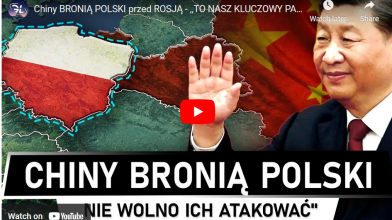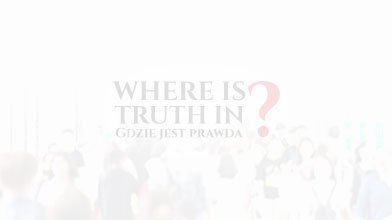Poland as a bridge of peace between the East and the West. Part 2
Poland as the bridge of peace between the East and the West. Part 2
Keep it up, Poland!
National political and social arrangements are heading to the moment when Poland, if it decides to make a profound change in its policy, can take a position in Europe by bringing new thoughts and new solutions to problems left from previous centuries. Contrary to appearances, this position of internal strength does not require either a new independence, which many of us dream of, or the power of a strong Three Seas. This position requires something different. It requires a bold look at ourselves and understanding where, in what feelings and values, our real strength is hidden, and in what feelings there is only a semblance of our strength, where there is a deep misrepresentation of our past and present. In good American slang, our task at the moment is "to see Shit from Shinola", that is, to be fully aware of where we are and what new choices lie before us, and where the old traps hide. The first formulation of the vision of Poland as a bridge of peace appeared exactly 3 years ago in an interview with Ziemkiewicz. Nowa Wspaniała Polska (12/27/2020) It was before the pandemic and... before the Ukrainian war.
We need, today even more than three years ago, a new look at the deep meaning of our geographical location, which indicates a new solution: to transform Poland from the bridge of wars between the East and the West that history has given us so far into the bridge of peace and friendship between West and East. I like that Ziemkiewicz and I have a common historical starting point - we begin with historical period with the observation that exactly when European powers were intensively developing, in the seventeenth and eighteenth centuries, Poland had been disappearing from the map of Europe for many years. This is a fact." We both admire Poland in the sixteenth and seventeenth centuries, where, as Ziemkiewicz points out, the Polish-Lithuanian Commonwealth was the mainstay of individual freedom in Europe. We agree that Poles are some of the most intelligent people in the world, and that freedom was and is our desire. And here is the following idea. If Poland was as deeply pervaded by freedom as Ziemkiewicz describes, then the collapse of Polish statehood as an expression of Polish society in the 17th and 18th centuries is completely natural, and there is hope in this naturalness. A free man has no desire to enslave another man, a free nation has no desire to enslave other nations, the society of a free nation does not enslave either members of its community nor any of its minorities. This means that a free nation is a peaceful nation. So it seems that the years before- and after- the partition changed our psyche from wanting fight to wanting peace.
It is surprising to me that a similar feeling about Poles can be found in Piłsudski's readings where he notes that Poles, thanks to their faith in divine providence, are no longer interested in war. Therefore, there is a historically psychological basis of the desire for peace within us that will help us transform Poland into a bridge of peace between the East and the West. Let us add that, according to surveys....85% of Poles see the greatest happiness in their family home, i.e. in a fundamentally peaceful institution.
The war with Ukraine has two contexts in which we can re-construct ourselves as a bridge of peace.
One of them is the one mentioned by my colleague Myślicki in the column What will Poland be like in 30 years (22/6/23). Myślicki's observation that both Poland and Ukraine constitute a unique route connecting the West with the East along China's Silk Road initiative through the two-way flow of goods between them is excellent and provides the answer we are looking for. Our position, together with Ukraine, gives us enormous power to shape the geopolitical future of EuroAsia. The main question is how to harness this power, the power of being exactly in the center between East and West. Myślecki adopts a binary (either/or) scheme and links Poland's position with American policy, hoping that in this way he will ensure America's involvement in Poland. Unfortunately, it also means, taking an anti-Chinese position in the context of US-China rivalry. Poland, as a bridge of peace, cannot choose sides here, but it must be helpful to both, it must facilitate understanding, not hinder it. Consequently, we propose a way out of this binary thinking by connecting the East and the West with the freedom of movement along the Silk Road and in this process of connecting we earn our own money for life as individuals, as a society, as a nation, as a state.
Surprising: At the same time as our discussion, Bednarski's reportage for the New Year 2024 appeared with special news for Poland in the title: "China defends Poland against Russia - It is our key partner." It seems that China is very interested in cooperation with Poland for purely economic reasons, the railway Silk Road from Beijing to the EU is the shortest through Poland, lasting 20-26 days. Bednarski claims that Lukashenko's recent visit to Beijing was caused by China's concern to improve relations between Belarus and Poland precisely because the shortest Silk Road runs through these two countries. And this is probably the first time in history that our geographical location is a motivation for peaceful development. It's interesting. It seems that the vision of Poland proposed here as a bridge of peace between the East and the West becomes real thanks to the Chinese vision of economic development.
The second context is the Ukrainian-Russian war.
This war must end, and end once and for all. To end it, you need to focus not so much on the balance of forces in the fight, but above all on the motivation that leads to the fight. As I noted previously, this is a bisociative war, meaning a war that draws its energy from two very different sources: on the one hand, Russia is motivated, rightly so, by the threat of being surrounded by NATO bases. On the other hand, Ukraine and other Eastern European countries faced an equally real threat from Russian armies on their borders. We see that the motivation of each of the fighting sides was and is a sense of threat. To achieve peace, therefore, both threatening possibilities must be eliminated simultaneously. Therefore, the following demand:
Armia rosyjska za Ural i USA/NATO z Europy.
Wycofanie się armii rosyjskiej za Ural uspokoii narody Europy Wschodniej graniczące z Rosją, wycofanie US/NATO z Europy uspokoi Rosję. W efekcie otrzymamy rozbrojony kontynent europejski od Uralu po wybrzeże Portugalii z Polską, poprzez jej położenie geograficzne, zapewniając płynny przepływ towarów pomiędzy Zachodem a Wschodem.
To jest historyczne Polskie posłannictwo i jej rola: zagwarantowanie pokoju w Europie przez przekształcenie się w most pokoju pomiędzy Zachodem i Wschodem.
Tak trzymać, Polsko!


